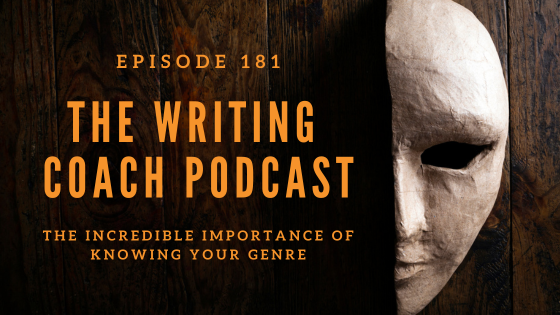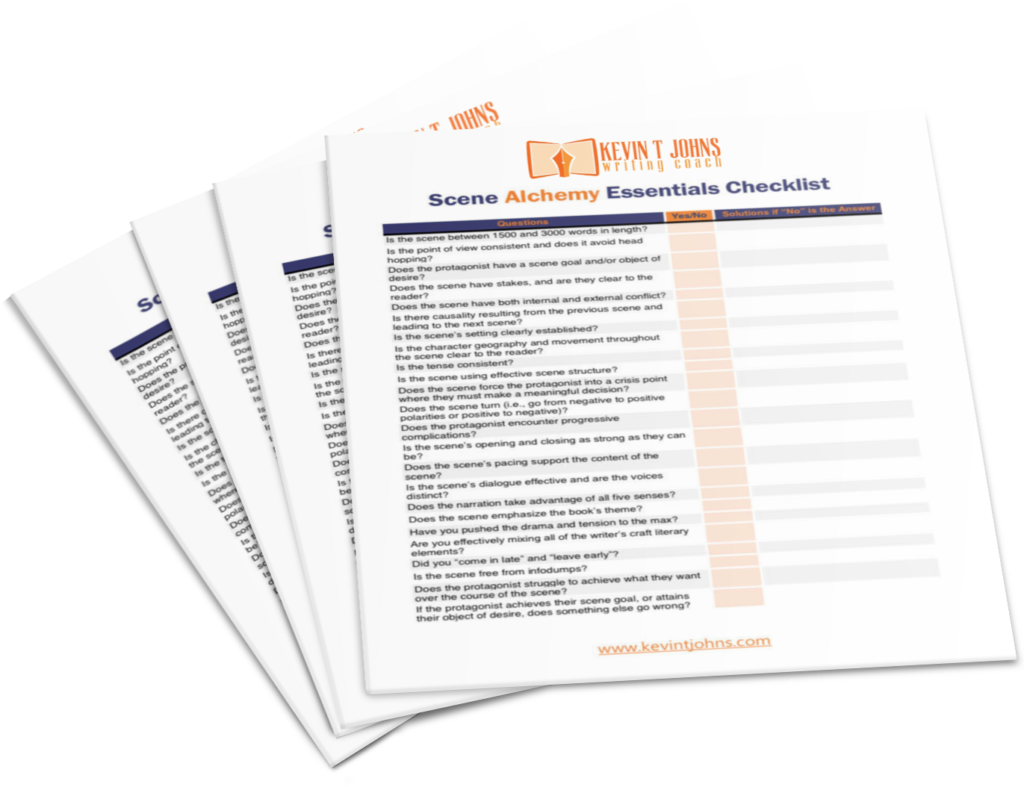In this episode of The Writing Coach podcast, writing coach Kevin T. Johns delves into the nuanced interplay between storytelling and genre, recognizing genre not merely as a classification but as a dynamic force shaping the very essence of a narrative.
He explores the profound impact of genre on storytelling concepts, controlling ideas, thematic values, story length and physical form.
Then, through the lens of seasoned insights from writers like Robert McKee and Chuck Palahniuk, he explains how a nuanced understanding of genre not only enhances storytelling but also dictates practical elements of the publishing landscape, shaping the reader’s experience from the story’s inception to its physical creation.
Listen now!
The Writing Coach Episode #181 Show Notes
Download the FREE Scene Alchemy Essentials Checklist Now!
The Writing Coach Episode #181 Transcript
Podcast: Play in new window | Download
Subscribe: Apple Podcasts | RSS
Hello beloved listeners, and welcome back to The Writing Coach podcast. I’m your host, Kevin T. Johns here.
I’m thrilled to announce the return of the Story Plan Intensive, my free four-week training program. It is set to launch its January 2024 edition. Registration is now open, so get signed up.
The goal of Story Plan Intensive is to help you craft a rock-solid outline for your book in 30 days or less. The program includes over 40 writer’s craft training videos, weekly homework assignments, and a supportive community of creative artists progressing through the program together. I’m immensely proud of the program and I hope you’ll join me this January. The time to sign up is now.
Like many of you, I’m contemplating my current work in progress, the final book in The Page Turners Trilogy—the series that marked the beginning of my writing career. The series blends sci-fi, horror, and fantasy, starting small and evolving into an epic story by its third installment. Crafting a three-book trilogy with a vast cast of characters and a fusion of multiple genres is just the type of thing a young, naive artist starting his career would set out to do. With a decade of writing and teaching experience, I might approach it differently now, but the path is set, and I’m currently juggling multiple storylines, characters, and genres.
The blend of genres in my current project has me reflecting on the importance of genre in writing. It plays a crucial role in helping readers choose their next book, whether perusing shelves in a bookstore or searching through categories on Amazon. Agents also rely on genre to determine which books to pitch to publishers and which writers to represent. Publishers themselves are organized around genres, with different houses focusing on distinct types of books. As lovers of literature and art, we appreciate and embrace genre. Whether it’s returning to a familiar one or delving into the intricacies of a specific genre, our fascination extends beyond literature to various forms of art.
I’m a devoted punk rock enthusiast, as you may already know. While to some, punk rock is a single genre, to me, it’s a vast umbrella encompassing over a dozen sub-genres. I could effortlessly rattle off names of various punk rock sub-genres from the top of my head. It might all sound like punk rock to you, but to me, and fellow punk rock enthusiasts, 80s hardcore punk rock from Washington DC sounds distinctly different from 90s pop punk originating in South California.
We take pride in being connoisseurs of a genre and deeply understanding its nuances as consumers and passionate fans.
In my experience working with numerous writers and artists, however, I’ve noticed a recurring challenge on the creative side. Many writers, particularly at the planning stage of their books or even midway through drafting or revising, struggle to pinpoint or narrow down the exact genre they’re working within.
This struggle might stem from the fact that we often think in terms of story, plot, or character rather than genre. Additionally, in modern storytelling, the prevalence of genre mashups, like my Page Turners Trilogy, can make it challenging to categorize work into a single genre. Perhaps, as artists, we resist being pigeonholed, avoiding the confinement of identifying with just one label.
Regardless of the reasons, it’s crucial for us to define our genre. We need to communicate to our readers the type of story we’re telling, approach the right agents, and tailor our query letters accordingly. Agents, in turn, need to confidently pitch our manuscripts to publishers, aligning with the genres they are actively seeking. While it may feel restricting, ultimately, narrowing down our genre is essential for effectively reaching our audience and navigating the publishing landscape.
Ultimately, we must define the category our book falls into.
But what exactly does that mean? How do we interpret and define this category?
I would argue that the genre category represents an agreement between the creator and the reader regarding the thematic elements to be explored in a story. It outlines the types of scenes to expect, the archetypal characters that will appear, and even details such as props, costumes, and locations—all of which are influenced by genre.
Consider the Western genre as a straightforward example. In this genre, props like guns and water bottles, costumes such as cowboy hats and elaborate dresses for women, and locations predominantly set in the desert of the American West with iconic elements like saloons and small-town prisons are all dictated by the genre. While this may be most evident in commercial genres like Western, sci-fi, or fantasy, every genre encompasses a set of ideas that the creator pledges to incorporate into the story when choosing a particular genre.
I like to envision genre as a sandbox—it establishes boundaries for the narrative and then populates that space with various elements or “toys” to engage with. For instance, if you’re crafting a science fiction story, you’ve defined the borders of your sandbox around a specific set of ideas. Within this space, you introduce elements like spaceships, aliens, laser guns—all the imaginative tools that a sci-fi writer might want to explore. These ideas become the anticipated “toys” for readers who are fans of science fiction, shaping their expectations for your story.
Navigating the intricacies of storytelling and genre became apparent in my First Draft group coaching program this week. Our focus this week was theme, and we delved deep into Robert McKee’s crucial idea of the controlling idea. McKee emphasizes that the controlling idea should be a single sentence and should center around a value shift in the story. The term “value shift” raised some questions among group members. The explanation is tied to genre; different genres involve different global values at stake. These global values are in constant tension or conflict throughout the story, with one ultimately prevailing—a shift in value.
For example, in a crime story, justice and injustice may be the conflicting values. When unsure about the genre or dealing with a genre mashup, even identifying the values at stake in the story can become murky. Understanding our genre and its inherent concepts allows for a deeper exploration of the category of story. It helps us identify the values at play, the recurring themes, and the dynamic character conflicts that echo throughout the genre. This clarity provides a wealth of material to enrich our storytelling and enables a more focused narrative.
Robert McKee underscores the significance of the controlling idea, emphasizing that it allows authors to zero in on the key values, themes, or the essence of the story, preventing it from becoming unclear.
Chuck Palahniuk echoes a similar sentiment in his writer’s craft book, Consider This, where he discusses minimalism. He suggests that stories aren’t about a myriad of things; instead, they revolve around three or four key elements explored from numerous angles. This approach ensures a more cohesive and impactful storytelling experience.
Once again, the exploration of what elements we’re incorporating into our story is heavily influenced by genre. Beyond shaping the story’s content, genre plays a pivotal role in determining the very structure of the narrative. Take, for instance, story length—a parameter that holds significant weight in traditional publishing. Certain genres come with expectations regarding the length of the narrative. A young adult story, for instance, is unlikely to span 200,000 words, just as a high fantasy novel typically leans towards a longer word count, often exceeding 60,000 words.
Moreover, the genre you’re writing in doesn’t just influence the length of your story; it can also dictate the physical form your book takes. Romance and erotic fiction, for instance, often find a natural fit in the e-book format, as readers prefer the convenience of electronically accessing these types of books rather than visiting a physical bookstore. On the other hand, literary fiction is more inclined to be published in paperback, emphasizing the tactile experience over the digital one. Thus, genre not only shapes the narrative within the pages but also extends its influence to the practical aspects of how the story is presented to and consumed by the audience.
On a related note, I’d like to take a brief detour. Among the many remarkable writers I’ve had the pleasure of working with is Peter Sherwood, a current client on the verge of completing an incredible book. As a Christmas gift, Peter gave me an annotated hardcover edition of Mrs. Dalloway, and it’s nothing short of breathtaking. Complete with captivating photos, illustrations, and insightful annotations, the book is a treasure. Though this may not directly tie into our discussion on genre, I found myself immersed in its pages last night, reveling in the exquisite feel of the paper. This edition boasts pages that exude a delightful smoothness without being overly glossy. So, if, like me, you appreciate the works of Virginia Woolf, I highly recommend exploring this awesome edition of Mrs. Dalloway. A huge shout-out and thank you to Peter for this thoughtful present.
Returning to our topic of genre…
Genre is so important that it is where we start in Story Plan Intensive, which is set to launch on January 1, 2024. Story Plan is an exciting opportunity for writers eager to embark on a structured and compelling writing journey to kick off the new year. If you find yourself yearning to breathe life into a book but have struggled with outlining or completing your manuscript, Story Plan Intensive is tailored just for you. Whether you’re a seasoned author seeking a more efficient way to plan your stories or a new writer facing challenges in the drafting and revision stages, this four-week immersive experience is designed to empower you in crafting an excellent outline for your next book, and the best part—it’s free.
Having worked with thousands of writers over the last decade, I understand the common challenges writers encounter in planning and organizing their stories. Story Plan Intensive addresses these challenges with a meticulously curated program that combines daily writer’s craft training videos and weekly creativity-stimulating assignments. Delivered straight to your inbox starting January 1, these videos delve into the intricacies of storytelling, offering valuable insights and practical techniques to elevate your planning process and expand your writer’s craft knowledge.
As a participant, you’ll engage in weekly creativity-stimulating assignments—designed not as tests but as thought-provoking exercises aimed at reinforcing learned concepts and applying them to your work. Throughout the program, you’ll have access to guidance and support within a vibrant community of fellow writers, all passionate about storytelling and undergoing the same program.
By the end of Story Plan Intensive, you’ll emerge with a robust and well-crafted outline, laying the foundation for a captivating writing journey. To seize this opportunity and turn your book idea into reality, register now, and then mark your calendars for January 1, 2024.
That’s it for this week’s episode. Thank you so much for tuning in. Don’t forget to hit that subscribe button and I will see you on the next episode of The Writing Coach.







